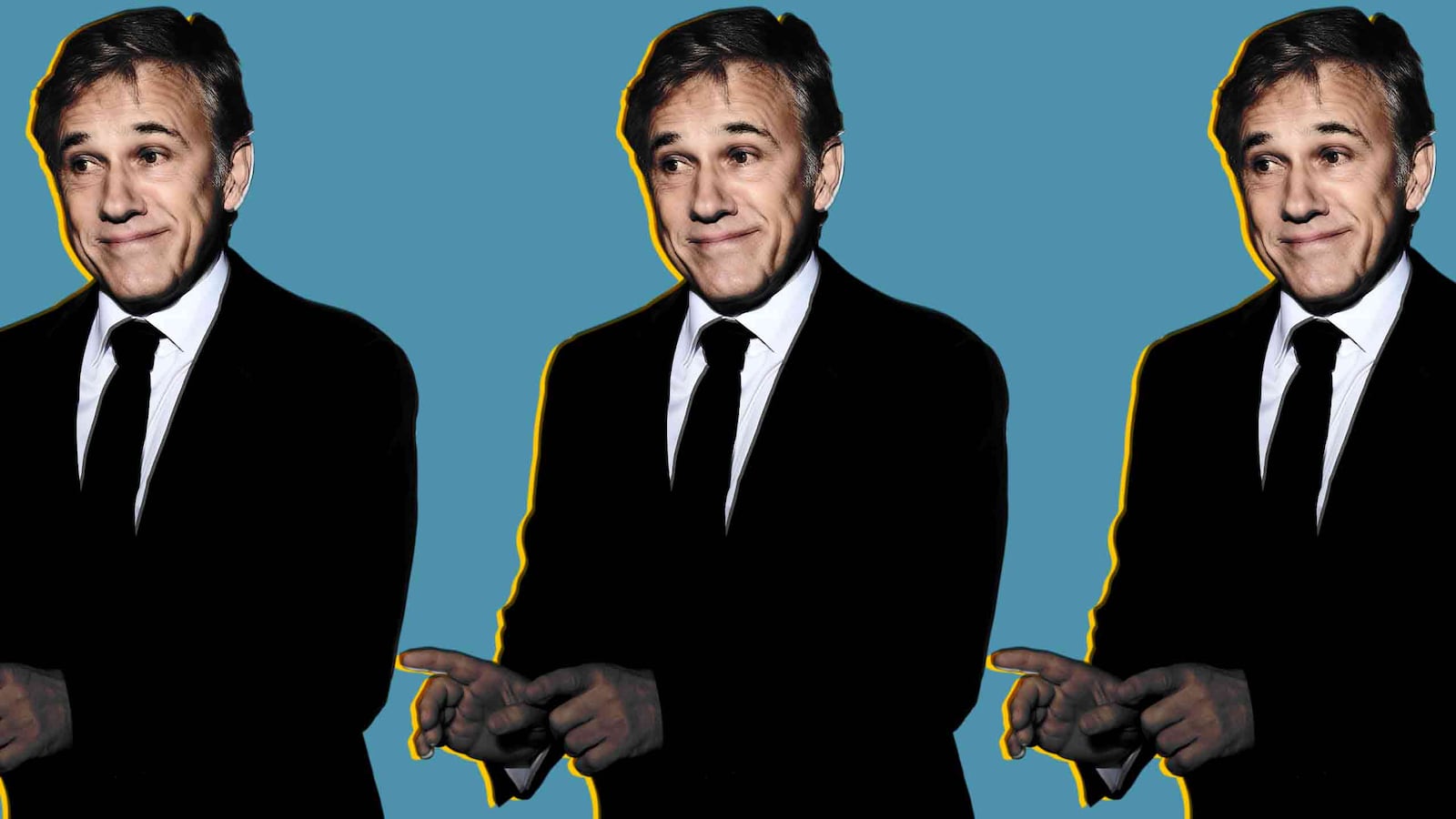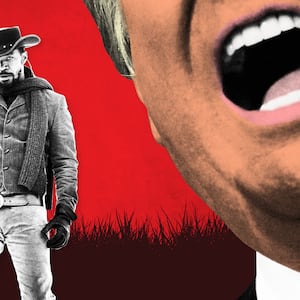Christoph Waltz can do just about anything on-screen, as evidenced by the diverse roles he’s tackled since winning his first Oscar for his breakout 2009 turn as the ruthless and cunning SS officer Hans Landa in Quentin Tarantino’s Inglourious Basterds. Be it as a bounty hunter in Tarantino’s Django Unchained (for which he won his second Academy Award), as a computer genius searching for the meaning of life in Terry Gilliam’s The Zero Theorem, or as the dishonest husband of artist Margaret Keane in Tim Burton’s Big Eyes, the 62-year-old Austrian actor has exhibited a range and versatility that’s made him one of Hollywood’s most valuable artists. And with his latest, Alita: Battle Angel, he continues that streak, proving that he’s always ready for a new challenge—which, in this case, means kicking some serious ass.
Not that he was chomping at the bit to get in on the rock-’em, sock-’em action.
“I’m not eager,” Waltz candidly admits about his combat duties in Robert Rodriguez’s sci-fi saga (in theaters Feb. 14). “Eagerness very easily turns into an obstacle. The action, if it’s required, I’m happy to do it. If it’s dangerous, I’m not doing it at all, because there are highly accomplished professionals to take care of that. And if it’s something I can do, I do it not only willingly, but happily. But eagerly? I wouldn’t call it that.”
If wielding a giant spike-like hammer wasn’t necessarily a bucket-list item for Waltz, Alita nonetheless demonstrates that he’s doggedly uninterested in repeating himself. Assuming the part of Dr. Dyson Ido, a genius scientist who, in a post-apocalyptic 2563, finds a discarded cyborg and resurrects her as Alita (Rosa Salazar), Waltz is the story’s kindly Dr. Frankenstein-ish father figure, dedicated to helping the robotically enhanced in need during the day, and secretly working for cash as a “hunter warrior” (a bounty hunter for cyborgs) at night. He’s the heart of the film, given the chance to fight some fearsome mecha-thugs, yes, but also tasked with holding the larger-than-life material together as its compassionate moral center.
It’s an indispensable position for which Waltz is well suited, even if many will find it a change of pace for him, considering his formidable skill at playing villains. First with Inglourious Basterds—a career-igniting project that catapulted the then largely unknown actor to sudden international fame and acclaim, replete with a Best Supporting Oscar for his embodiment of Nazi monstrousness (marked by a catchphrase, “That’s a bingo!” which continues to be an internet meme favorite)—and subsequently in The Green Hornet, The Three Musketeers, The Legend of Tarzan and Spectre (as iconic Bond adversary Ernst Stavro Blofeld), Waltz has established himself as one of modern cinema’s preeminent bad guys. Dr. Ido is anything but that, although Waltz explains that choosing characters often has less to do with their nobility or wickedness than with their ability to afford him a novel creative opportunity.
“The one thing that is important to me: that I do different things. If I’ve played a part, why try to do the same thing?,” he asks rhetorically. “I object to actors turning themselves into brands. The good guy/bad guy consideration is something that the audience should have, not me. I don’t look at that. I don’t pass moral judgments on characters that I’m asked to play. I just look at whether there’s something I can contribute valuably to the telling of the story.”
“[It’s] not between good and bad, but between things that I have done, things that I want to do, and things that are at my disposal,” he continues. “So that I don’t repeat myself, and that I learn something too—that I don’t just deliver in a kind of service industry-style professional way. That I get on with it, and learn new stuff.”
Alita: Battle Angel certainly qualifies in that regard. Based on a popular, long-running Japanese manga that producer James Cameron has tried to adapt for the past two decades, the Rodriguez-helmed film is a special-effects extravaganza driven by a traditional hero’s quest. Born anew with no memory of her past, and imbued with cutting-edge techno-power and martial arts-inspired fighting skills (known as “Panzer Kunst”), Alita sets out to discover and define her identity while also finding love (with Keean Johnson’s Hugo), justice, and her purpose in life. That odyssey eventually involves her participation in a chaotic sport known as Motorball (think high-speed Rollerball with robots) that’s run by Vector (fellow Best Supporting Actor Oscar winner Mahershala Ali), a shady character with ties to Dr. Ido’s wife Chiren (Jennifer Connelly) as well as an even more nefarious bigwig known as Nova, who rules the heavenly city of Zalem that hovers over Alita’s terrestrial Iron City home.
It’s a film that delivers a barrage of CGI spectacle (underscored by Alita’s giant animé-style eyes), and Waltz concedes that its sound and fury is far more important to those watching the finished product than to him and his fellow actors. “It’s the audience experience where [the size, and effects] should be appealing, and where it makes a difference,” he states. “For the people who work on it, it’s just more work, and longer hours, and the actor is probably the only constant in this whole process. Because the actor does what he does, and there’s no acting for big movies and acting for small movies. I wouldn’t really know what that could be anyway. So you do what you do, and what you need to do, and let the others worry about the size and extent and budget and effort to make the movie big.”
What drew Waltz to Alita, therefore, had less to do with its whiz-bang elements than with the creative team involved, and his ability to bring something vital to the table. “I look at the story, and of course, I get it from the people. But that’s where we all meet. That’s what we all agree on. That’s the story that wants to be told,” he says. “Once I come to terms with that, once I see the elements and narrative strands and sense and tangible content and all of these highfalutin connotations, I talk to the people about it. So it’s the story first, and the people second. Then, if the character that they want me to play is something where I feel not displaced, or misplaced, and where I feel that, yeah, I’m right, and I can understand why they want me, and I sort of agree, I say great, let’s do it. And if by then, I haven’t lost them, we’ll do it.”
Waltz has had experience working on tentpoles, most recently opposite Daniel Craig in 2015’s 007 blockbuster Spectre. Again, though, he views such expanded-movie-universe concerns as largely peripheral to his own responsibilities. “Franchising is really a commercial consideration, not necessarily a creative one. And I’m not 100 percent sure that it wouldn’t contradict my idea of what you call ‘balance,’” he confesses. “Of course, if it’s the same character but in different circumstances and different situations because it’s a different story, that’s fine. But to repeat, and just go through the motions, to satisfy the brand? That’s not exactly my dream of working in my profession.”
What he does pine for is a reunion with Tarantino, the auteur who plucked him out of relative cinematic obscurity and made him an instant star. Alas, that won’t be happening in the director’s upcoming Once Upon a Time in Hollywood, which will pivot its drama around the Charles Manson-led murder of actress Sharon Tate and feature a formidable cast headlined by Leonardo DiCaprio, Brad Pitt, Margot Robbie, and Al Pacino. After 2015’s The Hateful Eight, it’s the second straight Tarantino effort with which Waltz is unaffiliated. Still, ask him what makes their collaborations so fruitful, and the affection and admiration the actor has for the filmmaker is palpable—as is his overt desire to once more team up in the future.
“What works [with our relationship] is the stories,” Waltz reveals. “His stories always work. And his writing—the way he writes the parts, and the way he does everything that an actor really depends on in order to be really up to not just expectations, but his possibilities and his potential. So can I see [a reunion]? Well, I can see it in my dreams. And the rest is up to them!”







